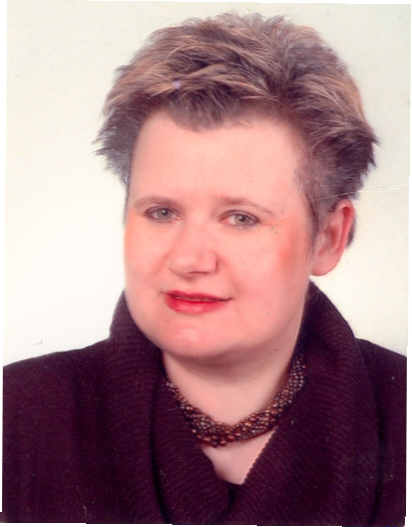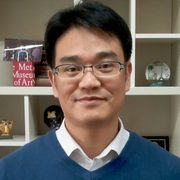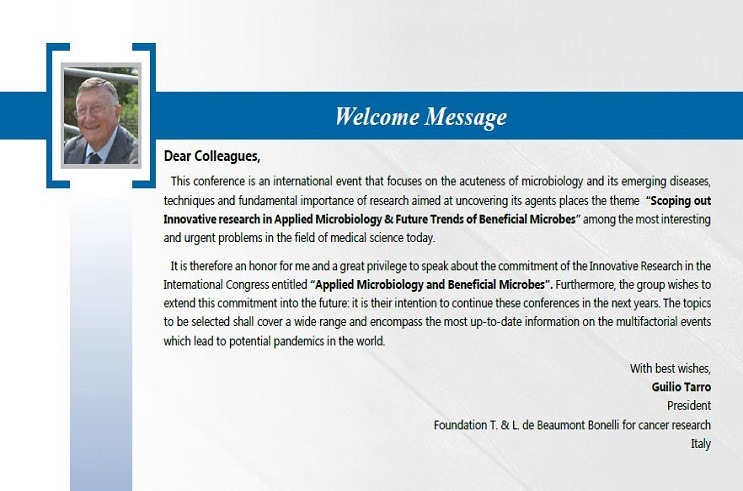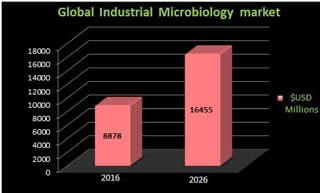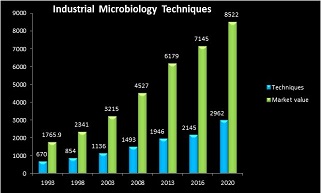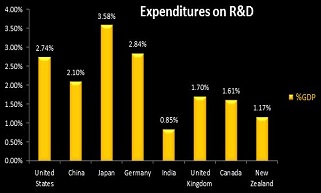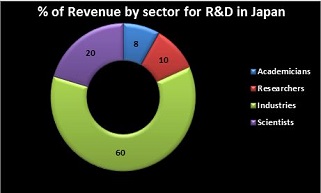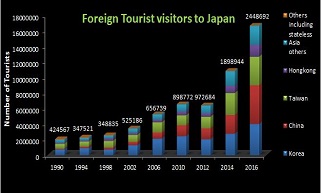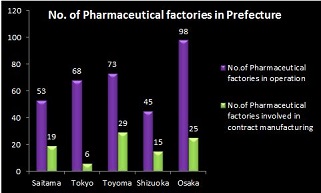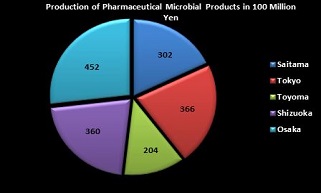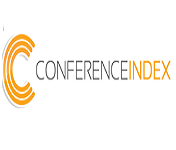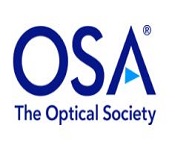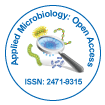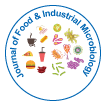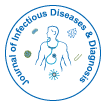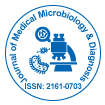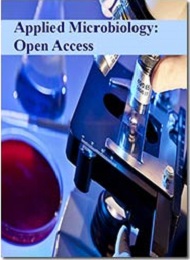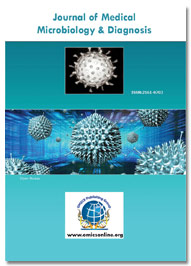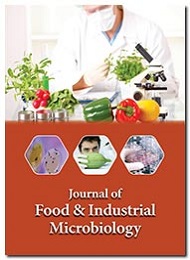Theme: Scoping out Innovative research in Applied Microbiology & Future Trends of Beneficial Microbes
Applied Microbes 2017
Meet leading global microbiology experts at 2nd International Conference on Applied Microbiology and Beneficial Microbes” which will be held during October 23-25, 2017 Osaka, Japan. We cordially welcome all the eminent scientists, doctors, researchers, students and delegates to take part in this upcoming Applied Microbiology congress to witness invaluable scientific discussions and contribute to the future innovations in the field of microbiology. This conference hosts presentations from experts and professionals across the world in the field of microbiology
Applied Microbes 2017 conference will focus on the latest and exciting innovations in all areas of current research trends of medical, food, industrial, pharmaceutical, environmental and marine microbiology, which offers a unique opportunity for investigators across the globe to meet, network, and perceive new scientific innovations. This year’s theme is “Scoping out Innovative research in Applied Microbiology & Future Trends of Beneficial Microbes” reflects the innovative progress in research of various microbiology fields. The three days conference includes special keynote sessions by eminent and renowned speakers who excel in the field of microbiology which include the topics Medical and public health microbiology, Pharmaceutical microbiology, Fermenters and Fermentation, Microbial biotechnology and Bioinformatics, Microbial biochemistry, Food and Beverage microbiology, Agricultural microbiology, Veterinary microbiology, Environmental microbiology, Water and Marine microbiology, Aeromicrobiology, Microbial Nanotechnologies, Industrial microbiology, Biofuels and Petroleum microbiology, Biopharmaceuticals, Biofilms, Antibiotics and Chemotherapy, Prebiotics and Probiotics, Brewing Microbiology, Clinical and diagnostic microbiology, Microbial Ecology, Geomicrobiology, Genetic Engineering, Metabolic Engineering, Oral microbiology, Molecular Microbiology, Cellular microbiology, Vaccinology and Immunology, Soil microbiology and nutrient cycling, Forensic microbiology.
This International Applied Microbiology and Beneficial Microbes Conference also encourages the active participation of young student researchers as we are hosting Young Research forum and poster presentations at the conference venue.
We look forward to an exciting meeting in October 2017 that promises great scientific debate and enjoyable social interaction. We also hope you will enjoy your visit to the most attractive and dynamic city Osaka in Japan.
Why to attend?
With members from around the world focused on learning about Applied Microbiology and Beneficial Microbes and its advances in innovation of pharmaceutical, food, brewing industries and hospitals and research organizations. This is the best opportunity to reach the largest assemblage of participants from the microbiology community conduct presentations, distribute information, meet with current and potential scientists, make a splash with new microbiology techniques in recent trends, and receive name recognition at this 3-day event. World-renowned speakers, scientists, doctors, the most recent innovations, developments, and the newest updates in Applied Microbiology and Beneficial Microbes are importance of this conference.
Target Audience:
· Doctors
· Scientists
· Pharmacists
· Medical Microbiologists
· Microbiology Researchers
· Food and Beverage industry
· Brewing Industry
· Students and Scholars
· Microbiology companies
· Healthcare sectors
· Pharmaceutical Associations and Societies
· Medical Associations and Societies
· Food Societies and Associations
· Pharmaceutical industries
· Research Institutes
· Industrial Business Entrepreneurs
· Dairy and food sector industries
· Genetic engineering and Biotechnology researchers
Track 1: Microbiology
Microbiology is the study of microorganisms of various sub-disciplines such virology, phycology, mycology, parasitology, bacteriology, protozoology and nematology. It is also sub-divided into pure and applied microbiology
Related conferences : 3rd Worlds Congress on Beneficial Microbes: Food, Pharma, Aqua & Beverages Industry, Sep 18-20,2017,Houston,USA; 19thInternational Conference on Molecular Genetics and Microbiology, January 23-24,2017 Paris, France; 2nd International Conference on Antimicrobial Agents and Chemotherapy October 19-20, 2017 Atlanta, Georgia, USA; 19th International Conference on Antimicrobial Chemotherapy, April 24-25,2017,Boston,USA; 6th annual Pharmaceutical Microbiology conference Jan 18-19 2017, Holiday Inn Kensington Forum in London, UK; Applied and environmental microbiology July 16-21 2017, USA; PDA Europe Pharmaceutical Microbiology 14 -15 Feb 2017, Portugal; 19th International Conference on Industrial Microbiology and Biotechnology 16-17 Feb 2017, London, UK
Track 2: Applied microbiology
Innovations in applied microbiology is triggering now -a-days in various fields of research. Their applications serve as Exo-microbiology, bio-weapons, bioremediation, biosensors, biomarkers, nanomicrobiology, predictive microbiology, evolutionary microbiology, paleomicrobiology, archaeomicrobiology. Some of the recent techniques include Magnetotactic bacteria and Magnetosomes.
Related conferences: 3rd Worlds Congress on Beneficial Microbes: Food, Pharma, Aqua & Beverages Industry, Sep 18-20,2017,Houston,USA; 19thInternational Conference on Molecular Genetics and Microbiology, January 23-24,2017 Paris, France; 2nd International Conference on Antimicrobial Agents and Chemotherapy October 19-20, 2017 Atlanta, Georgia, USA; 19th International Conference on Antimicrobial Chemotherapy, April 24-25,2017,Boston,USA; 6th annual Pharmaceutical Microbiology conference Jan 18-19 2017, Holiday Inn Kensington Forum in London, UK; Applied and environmental microbiology July 16-21 2017, USA; PDA Europe Pharmaceutical Microbiology 14 -15 Feb 2017, Portugal; 19th International Conference on Industrial Microbiology and Biotechnology 16-17 Feb 2017, London, UK
Track 3: Beneficial Microbes
Beneficial Microbes are the microorganisms are exceptionally useful to different businesses and humankind. Bioremediation is a waste administration strategy that includes the utilization of life forms to expel or kill poisons from a debased site. Biosorption can be characterized as the evacuation of metal or metalloid species, mixes and particulates from an answer. This can be a noteworthy inactive process in living and dead creatures a few shoddy biosorbents for the evacuation of metals for the most part are microbes, organisms, green growth, plants, mechanical squanders, agrarian squanders and other polysaccharide materials. Bioaccumulation of heavy metals has received a great deal of attention in recent years for both its scientific novelty and application potential. Microorganisms are potent bioremediators removing metals from relatively dilute solutions via active or passive uptake mechanisms. Microorganisms are vastly beneficial in food industry, pharma industry, brewing industry and agricultural industry.
Related Conferences: 7th Clinical Microbiology Congress February 27-28, 2017 Amsterdam, Netherlands; 3rd World Congress and Expo on Applied Microbiology, Nov 7-9, 2016; 7th Congress of European Microbiologists, July 9-13,2017 Valencia, Spain; 2nd International Conference and Expo on Water Microbiology & Novel Technologies, August 28-30,2017 Philadelphia; 6th annual Pharmaceutical Microbiology conference Jan 18-19 2017, Holiday Inn Kensington Forum in London, UK; Applied and environmental microbiology July 16-21 2017, USA; PDA Europe Pharmaceutical Microbiology 14 -15 Feb 2017, Portugal; 19th International Conference on Industrial Microbiology and Biotechnology 16-17 Feb 2017, London, UK
Track 4: Medical and public health microbiology
Medical microbiology deals with the body's reaction towards attacking microorganisms. Bacteriology, virology, mycology, parasitology, the principle sub-fields of microbiology are initially secured with the general ideas of cytology and physiology of various microorganisms, and with significant pathogens of man. Microbial eras are sufficiently keen to bring about an adjustment in their resistance designs, opening a pathway for the improvement of new systems and rising patterns in the battle against microbial contaminations. There has been an enormous change in strategies and symptomatic devices from casing of the nucleic corrosive to circle biomarker examines. Various diseases such bacterial, fungal, viral diseases and related treatment. Public health microbiology deals with the segregation of reliable information of infectious diseases, its prevention and control
Related Conferences: 7th Clinical Microbiology Congress February 27-28, 2017 Amsterdam, Netherlands; 3rd World Congress and Expo on Applied Microbiology, Nov 7-9, 2016; 7th Congress of European Microbiologists, July 9-13,2017 Valencia, Spain; 2nd International Conference and Expo on Water Microbiology & Novel Technologies, August 28-30,2017 Philadelphia; 6th annual Pharmaceutical Microbiology conference Jan 18-19 2017, Holiday Inn Kensington Forum in London, UK; Applied and environmental microbiology July 16-21 2017, USA; PDA Europe Pharmaceutical Microbiology 14 -15 Feb 2017, Portugal; 19th International Conference on Industrial Microbiology and Biotechnology 16-17 Feb 2017, London, UK
Track 5: Clinical and diagnostic microbiology
Clinical microbiology is a bureau of therapeutic science stressed with the avoidance, forecast and cure of irresistible sicknesses. Advance, this train of innovative know-how inquire about various logical uses of organisms for the change of wellbeing condition. There are four sorts of microorganisms that cause irresistible sickness: microscopic organisms, growths, parasites and infections, and the type of irresistible protein known as prion.
A clinical microbiology look into the attributes of pathogens, their methods of transmission, systems of defilement and increment. The use of this data, a cure might be conceived. Clinical microbiologists regularly fill in as experts for doctors, introducing distinguishing proof of pathogens and proposing cure alternatives. A biosensor is a logical instrument which changes over a natural replication into an electrical flag. The expression "biosensor" is regularly used to decide the centralization of substances and different parameters of organic intrigue. Biomarkers are pointers which distinguish different organic properties and atoms and show unhealthy procedures in the body.
Diagnostic microbiology deals with the application of microbiology in medical diagnosis and relevant techniques such as microbial techniques,serology techniques, microscopic techniques, cultural techniques to diagnose the disease
Related Conferences: 7th Clinical Microbiology Congress February 27-28, 2017 Amsterdam, Netherlands; 3rd World Congress and Expo on Applied Microbiology, Nov 7-9, 2016; 7th Congress of European Microbiologists, July 9-13,2017 Valencia, Spain; 2nd International Conference and Expo on Water Microbiology & Novel Technologies ,August 28-30,2017 Philadelphia; 6th annual Pharmaceutical Microbiology conference Jan 18-19 2017, Holiday Inn Kensington Forum in London, UK; Applied and environmental microbiology July 16-21 2017, USA; PDA Europe Pharmaceutical Microbiology 14 -15 Feb 2017, Portugal; 19th International Conference on Industrial Microbiology and Biotechnology 16-17 Feb 2017, London, UK
Track 6: Pharmaceutical microbiology
Pharmaceutical microbiology is the associated branch of connected microbiology which grants drug specialists to make pharmaceuticals from microorganisms either particularly or with the use of some item created by them. Pharmaceutical microbiology consolidates imaginative hostile to microbial specialists, organic pointers, antibodies and anti-infection agents and its innovative work and so on. It deals with the quality control techniques, sterile pharmaceutical manufacturing and microbial monitoring of biological drugs.
Related Conferences: Microbial Engineering Conference on May 29-31 2017 Beijing, China; Medical and clinical microbiology conference July 03-05 2017 Bangkok, Thailand; Pharmaceutical Microbiology Conference June 21-23 2017 London UK; RNA Nano Technology conferences January 21-22 2017 USA; World Microbiologists June 21-23, 2017 Philadelphia, USA; Beneficial Microbes September, 18-20, 2017, USA; Pharmaceutical Microbiology Conference January 18-19 2017, London, UK; 19th International Conference on Environmental, Industrial and Applied Microbiology January 23-24 2017, Paris, France; 19th International Conference on Industrial Microbiology and Biotechnology 16-17 Feb 2017 London, UK; 6th annual Pharmaceutical Microbiology conference Jan 18-19 2017, Holiday Inn Kensington Forum in London, UK
Track 7: Industrial microbiology
Industrial microbiology is an area of applied microbiology which deals with screening, management, and exploitation of microorganisms for the engenderment of utilizable end products on an immensely colossal scale. It plays a key role in the various industries such as food, dairy, medical, brewing and cosmetic industry.
Related Conferences: Clinical Microbiology conferences February 27-28 2017 Amsterdam, Netherlands; Virology Congress and Expo conferences March 13-14 2017 London, UK; on Microbial Engineering, Conference on May 29-31 2017 Beijing, China; Medical and clinical microbiology conference July 03-05 2017 Bangkok, Thailand; Pharmaceutical Microbiology Conference June 21-23 2017 London UK; RNA Nano Technology conferences January 21-22 2017 USA; 6th annual Pharmaceutical Microbiology conference Jan 18-19 2017, Holiday Inn Kensington Forum in London, UK; Applied and environmental microbiology July 16-21 2017, USA; PDA Europe Pharmaceutical Microbiology 14 -15 Feb 2017, Portugal; 19th International Conference on Industrial Microbiology and Biotechnology 16-17 Feb 2017, London, UK
Track 8: Fermenters and Fermentation
Fermenter is an organism that causes fermentation. Fermentation is a process of chemical change caused by organisms or their products, usually producing effervescence and heat. There are various methods for the extraction of Fermentation Products. Fermentation in food processing is the process of converting carbohydrates to organic acids or alcohols using microorganisms under anaerobic conditions and optimising cell culture process.
Related conferences: 3rd Worlds Congress on Beneficial Microbes: Food, Pharma, Aqua & Beverages Industry, Sep 18-20,2017,Houston,USA; 19thInternational Conference on Molecular Genetics and Microbiology, January 23-24,2017 Paris, France; 2nd International Conference on Antimicrobial Agents and Chemotherapy October 19-20, 2017 Atlanta, Georgia, USA; 19th International Conference on Antimicrobial Chemotherapy, April 24-25,2017,Boston,USA; 6th annual Pharmaceutical Microbiology conference Jan 18-19 2017, Holiday Inn Kensington Forum in London, UK; Applied and environmental microbiology July 16-21 2017, USA; PDA Europe Pharmaceutical Microbiology 14 -15 Feb 2017, Portugal; 19th International Conference on Industrial Microbiology and Biotechnology 16-17 Feb 2017, London, UK
Track 9: Microbial biotechnology and Bioinformatics
Microbial Biotechnology is a branch of science that deals with the genetic manipulation of microorganisms and their techniques to improve life and health. It uses various biological processes of microorganisms for various applications in industries. Bioinformatics is a field that develops methods and software tools for the interpretation of biological data. This has a revolutionary computation speed in the analysis for the control of microorganisms. Metagenomics is the genomic analysis of microorganisms by extraction and cloning of DNA from an assemblage of microorganisms. Biochips and tissue chips,
Related conferences: 3rd Worlds Congress on Beneficial Microbes: Food, Pharma, Aqua & Beverages Industry, Sep 18-20,2017,Houston,USA; 19thInternational Conference on Molecular Genetics and Microbiology, January 23-24,2017 Paris, France; 2nd International Conference on Antimicrobial Agents and Chemotherapy October 19-20, 2017 Atlanta, Georgia, USA; 19th International Conference on Antimicrobial Chemotherapy, April 24-25,2017,Boston,USA; 6th annual Pharmaceutical Microbiology conference Jan 18-19 2017, Holiday Inn Kensington Forum in London, UK; Applied and environmental microbiology July 16-21 2017, USA; PDA Europe Pharmaceutical Microbiology 14 -15 Feb 2017, Portugal; 19th International Conference on Industrial Microbiology and Biotechnology 16-17 Feb 2017, London, UK
Track 10: Microbial biochemistry
Microbial biochemistry incorporates of biochemical reactions in microbial growth, different mechanisms/ techniques of pathogenesis required in inflicting contamination/ illnesses in the host. It consists of studies related to of growth, cell shape, metabolism, functions and the interactions of biological macromolecules, like carbohydrates, proteins, Fatty Acids and Lipids and nucleic acids of microbes; which cater the skeletal component and foundation of capabilities affiliated with lifestyles. Biochemical research of microbes is important in the mode of their action. Post genomic analyses, mechanisms, & replication, integrating plasmid functions, conjugation structures and regulatory network are the key factors that play a critical function in metabolism of microbes. While monomers are co-connected to synthesize a polymer, dehydration takes place regularly ensuing in assembly of various macromolecules in tons large complexes.
Track 11: Food and Beverage microbiology
Food microbiology is the branch of science that deals with the scientific study of microorganisms that are present in food and are useful for the production of food. This includes microorganisms that are present in the food as well as that are used for its production. It deals with food safety and food processing techniques.
Related Conferences: 7th Clinical Microbiology Congress February 27-28,2017 Amsterdam, Netherlands; 3rd World Congress and Expo on Applied Microbiology, Nov 7-9, 2016; 7th Congress of European Microbiologists, July 9-13,2017 Valencia, Spain; 2nd International Conference and Expo on Water Microbiology & Novel Technologies, August 28-30,2017 Philadelphia; 6th annual Pharmaceutical Microbiology conference Jan 18-19 2017, Holiday Inn Kensington Forum in London, UK; Applied and environmental microbiology July 16-21 2017, USA; PDA Europe Pharmaceutical Microbiology 14 -15 Feb 2017, Portugal; 19th International Conference on Industrial Microbiology and Biotechnology 16-17 Feb 2017, London, UK
Track 12: Dairy microbiology
Dairy Microbiology is currently engaged in research, teaching, consultancy, training and technology transfer in specialized field of Dairy Microbiology. The research work of the division covers the areas related to starter cultures and fermented milk products; direct vat starters (DVS); indigenous probiotics, their functional efficacy and gut microbiota, prebiotics and synbiotics; bioactive peptides, microbial metabolites and biopreservatives; biosensors, quality assurance and food safety as well as rumen micro-organisms. New technologies on two indigenous strains of probiotics, Misti Dahi, rapids kits for antibiotic residues, Listeria monocytogenes and Enterococci to potential stake holders in our country for their industrial application. Few more such products like carbonated lassi, vitamin B12 rich propioni-yoghurt, blueberry fortified probiotic dahi, real time test for detection of E. coli and antibiotic residues in milk have been developed and are under process of validation for their commercialization.
Related conferences: 3rd Worlds Congress on Beneficial Microbes: Food, Pharma, Aqua & Beverages Industry, Sep 18-20,2017,Houston,USA; 19thInternational Conference on Molecular Genetics and Microbiology, January 23-24,2017 Paris, France; 2nd International Conference on Antimicrobial Agents and Chemotherapy October 19-20, 2017 Atlanta, Georgia, USA; 19th International Conference on Antimicrobial Chemotherapy, April 24-25,2017,Boston,USA; 6th annual Pharmaceutical Microbiology conference Jan 18-19 2017, Holiday Inn Kensington Forum in London, UK; Applied and environmental microbiology July 16-21 2017, USA; PDA Europe Pharmaceutical Microbiology 14 -15 Feb 2017, Portugal; 19th International Conference on Industrial Microbiology and Biotechnology 16-17 Feb 2017, London, UK
Track 13: Agricultural microbiology
Agricultural Microbiology is a scientific discipline of microbiology dealing with plant related microbes and plant and animal diseases. It also deals with the microbiology of soil fertility, such as microbial degradation of organic matter and manures, microbial pesticides, biological control agents etc. Bio fertilizers help in the growth of plants by enhancing the supply of primary nutrients to the plant.
Related Conferences: 6th International conference on Environmental Microbiology & Soil Microbiology September 18-20, 2017 Toronto, Canada; 12th International Congress on Microbial Interaction and Applications of Beneficial Microbes July 17-18, 2017 Munich, Germany; 4th World Congress and Expo on Applied Microbiology November 09-10, 2017 Madrid, Spain; International Conference on Microbial Ecology September 18-20, 2017 Toronto, Canada; 6th annual Pharmaceutical Microbiology conference Jan 18-19 2017, Holiday Inn Kensington Forum in London, UK; Applied and environmental microbiology July 16-21 2017, USA; PDA Europe Pharmaceutical Microbiology 14 -15 Feb 2017, Portugal; 19th International Conference on Industrial Microbiology and Biotechnology 16-17 Feb 2017, London, UK
Track 14: Veterinary microbiology
Veterinary Microbiology is an important platform that gives veterinarians and microbiologists an inter-disciplinary forum, where, they can study various aspects of the infections caused by the pathogenic microorganisms- the bacterial, viral & fungal infections in the animals, especially cattle by providing an in-depth understanding of ramifications of the microbial infections on the well-being of the animal, human health, and the economy. It primarily deals with the diagnosis of diseases of the animals. The field deals with the epidemiology, infection control, ethics, animal husbandry, and dairy technology.
Related conferences: 3rd Worlds Congress on Beneficial Microbes: Food, Pharma, Aqua & Beverages Industry, Sep 18-20,2017,Houston,USA; 19thInternational Conference on Molecular Genetics and Microbiology, January 23-24,2017 Paris, France; 2nd International Conference on Antimicrobial Agents and Chemotherapy October 19-20, 2017 Atlanta, Georgia, USA; 19th International Conference on Antimicrobial Chemotherapy, April 24-25,2017,Boston,USA; 6th annual Pharmaceutical Microbiology conference Jan 18-19 2017, Holiday Inn Kensington Forum in London, UK; Applied and environmental microbiology July 16-21 2017, USA; PDA Europe Pharmaceutical Microbiology 14 -15 Feb 2017, Portugal; 19th International Conference on Industrial Microbiology and Biotechnology 16-17 Feb 2017, London, UK
Track 15: Environmental microbiology
Environmental microbiology is the study of the composition and physiology of microbial communities in the environment. The environment in this case means the soil, water, air and sediments covering the planet and can also include the animals and plants that inhabit these areas. Environmental microbiology also includes the study of microorganisms that exist in artificial environments such as bioreactors.
Related Conferences: 6th International conference on Environmental Microbiology & Soil Microbiology September 18-20, 2017 Toronto, Canada; 12th International Congress on Microbial Interaction and Applications of Beneficial Microbes July 17-18, 2017 Munich, Germany; 4th World Congress and Expo on Applied Microbiology November 09-10, 2017 Madrid, Spain; International Conference on Microbial Ecology September 18-20, 2017 Toronto, Canada; 6th annual Pharmaceutical Microbiology conference Jan 18-19 2017, Holiday Inn Kensington Forum in London, UK; Applied and environmental microbiology July 16-21 2017, USA; PDA Europe Pharmaceutical Microbiology 14 -15 Feb 2017, Portugal; 19th International Conference on Industrial Microbiology and Biotechnology 16-17 Feb 2017, London, UK
Track 16: Water microbiology and marine microbiology
Water microbiology is concerned with the microorganisms that live in water, or transferred from one habitat to another by water. Another group of microbes of concern in water microbiology are protozoa. The two protozoa of the most concern are Giardia and Cryptosporidium. They live normally in the intestinal tract of animals such as beaver and deer. Giardia and Cryptosporidium form dormant and hardy forms called cysts during their life cycles. The cyst forms are resistant to chlorine, which is the most popular form of drinking water disinfection, and can pass through the filters used in many water treatment plants. If ingested in drinking water they can cause debilitating and prolonged diarrhoea in humans, and can be life threatening to those people with impaired immune. Marine microbiology is that the study of microorganisms and non-organismic microbes that exist in water environments, together with the open ocean, coastal waters, briny water, estuaries, on marine surfaces and in sediments, they need difficult identities marine biology deals with all terribly little life and life-like biological phenomena: non-organismic microbes, bacteria, protoctist blooms, Archaea, protozoans, non-cellular protoctist and really little cellular plants, fungi, and animals.
Related conferences: 3rd Worlds Congress on Beneficial Microbes: Food, Pharma, Aqua & Beverages Industry, Sep 18-20,2017,Houston,USA; 19thInternational Conference on Molecular Genetics and Microbiology, January 23-24,2017 Paris, France; 2nd International Conference on Antimicrobial Agents and Chemotherapy October 19-20, 2017 Atlanta, Georgia, USA; 19th International Conference on Antimicrobial Chemotherapy, April 24-25,2017,Boston,USA; 6th annual Pharmaceutical Microbiology conference Jan 18-19 2017, Holiday Inn Kensington Forum in London, UK; Applied and environmental microbiology July 16-21 2017, USA; PDA Europe Pharmaceutical Microbiology 14 -15 Feb 2017, Portugal; 19th International Conference on Industrial Microbiology and Biotechnology 16-17 Feb 2017, London, UK
Track 17: Aeromicrobiology
Aero-Microbiology is the study of living animate microbes that are quiescent in the air. These microbes are attributed to as bio-aerosols .There are significantly earth atmospheric microorganisms than in oceans and soils; there is still a large bounteous number that they can affect the atmosphere . Once attributed in the air column, these microbes have the scope to travel long distances with the help of air and precipitation, increasing the occurrence of widespread disease by these microbes. These aerosols are ecologically suggestive because they can be identify with disease in humans, animals and plants. Typically microbes will be dependent in clouds. They are able to execute processes that alter the chemical composition of the cloud, and may even induce condensation.
Related Conferences: 6th International conference on Environmental Microbiology & Soil Microbiology September 18-20, 2017 Toronto, Canada; 12th International Congress on Microbial Interaction and Applications of Beneficial Microbes July 17-18, 2017 Munich, Germany; 4th World Congress and Expo on Applied Microbiology November 09-10, 2017 Madrid, Spain; International Conference on Microbial Ecology September 18-20, 2017 Toronto, Canada; 6th annual Pharmaceutical Microbiology conference Jan 18-19 2017, Holiday Inn Kensington Forum in London, UK; Applied and environmental microbiology July 16-21 2017, USA; PDA Europe Pharmaceutical Microbiology 14 -15 Feb 2017, Portugal; 19th International Conference on Industrial Microbiology and Biotechnology 16-17 Feb 2017, London, UK
Track 18: Nanomicrobiology
Nanomicrobiology is the study of microbes using nanotechnology. Nanotechnology deals with the technology in nanometer scale that is from 1 to 100nm. Nanotechnology works in creating and manipulating organic and inorganic matter at a nanoscale. Microbiology relates to Nano science at various stages. Many microbial entities are nano-machines in nature. Various nanotechnologies serve as therapeutic tools. Mycofabrication is defined as the synthesis of metal nanoparticles using fungi.
Related conferences: 3rd Worlds Congress on Beneficial Microbes: Food, Pharma, Aqua & Beverages Industry, Sep 18-20,2017,Houston,USA; 19thInternational Conference on Molecular Genetics and Microbiology, January 23-24,2017 Paris, France; 2nd International Conference on Antimicrobial Agents and Chemotherapy October 19-20, 2017 Atlanta, Georgia, USA; 19th International Conference on Antimicrobial Chemotherapy, April 24-25,2017,Boston,USA; 6th annual Pharmaceutical Microbiology conference Jan 18-19 2017, Holiday Inn Kensington Forum in London, UK; Applied and environmental microbiology July 16-21 2017, USA; PDA Europe Pharmaceutical Microbiology 14 -15 Feb 2017, Portugal; 19th International Conference on Industrial Microbiology and Biotechnology 16-17 Feb 2017, London, UK
Track 19: Biofuels and Petroleum microbiology
Microbial fuel cell is equipment that enhances the power of microbes to convert organic substrates into electrical energy .This is a mechanism of converting chemical energy to electrical energy by oxidation reduction reactions. It is a recent attraction for producing bio electricity using the biodegradable substrates as fuel. Now -a- days efflux pumps are used for better production of biofuels such as bioelectricity, biohydrogen and bioethanol etc.
Related conferences: Microbial Engineering Conference on May 29-31 2017 Beijing, China; Medical and clinical microbiology conference July 03-05 2017 Bangkok, Thailand; Pharmaceutical microbiology Conference June 21-23 2017 London UK; RNA Nano Technology conferences January 21-22 2017 USA; World Microbiologists June 21-23, 2017 Philadelphia, USA; Beneficial Microbes September, 18-20, 2017, USA; Pharmaceutical Microbiology Conference January 18-19 2017, London, UK; 19th International Conference on Environmental, Industrial and Applied Microbiology
January 23-24 2017, Paris, France; 19th International Conference on Industrial Microbiology and Biotechnology 16-17 Feb 2017 London, UK; 6th annual Pharmaceutical Microbiology conference Jan 18-19 2017, Holiday Inn Kensington Forum in London, UK
Track 20: Biopharmaceuticals
Biopharmaceutical is a biological molecule or component of a cell which serves as a pharmaceutical. It is extracted, manufactured or synthesized from biological origin through biotechnology. The manufacturing requires ensuring their safety, quality and efficacy. Marine actinobacteriology is one of the evolving areas of research because of their unique metabolites and enzymes which possess biological activity and have a potential to be developed as therapeutic agent. Transgenics is a branch of biology that deals with the transgenic organisms. It is the engineering of organisms in order to produce wide variety of enzymes and proteins that have a major role as catalysts in various industrial chemical reactions.
Related Conferences: 7th Clinical Microbiology Congress February 27-28, 2017 Amsterdam, Netherlands; 3rd World Congress and Expo on Applied Microbiology, Nov 7-9, 2016; 7th Congress of European Microbiologists, July 9-13,2017 Valencia, Spain; 2nd International Conference and Expo on Water Microbiology & Novel Technologies ,August 28-30,2017 Philadelphia; 6th annual Pharmaceutical Microbiology conference Jan 18-19 2017, Holiday Inn Kensington Forum in London, UK; Applied and environmental microbiology July 16-21 2017, USA; PDA Europe Pharmaceutical Microbiology 14 -15 Feb 2017, Portugal; 19th International Conference on Industrial Microbiology and Biotechnology 16-17 Feb 2017, London, UK
Track 21: Biofilms
Biofilm is an accumulation of microorganisms in which cells adhere to each other and customarily these phones join to a surface. These adherent cells are as often as possible implanted inside a self-distributed grid of extracellular polymeric substance (EPS). Biofilm extracellular polymeric substance, which is likewise alluded to as ooze composed out of extracellular DNA, proteins, and polysaccharides. Applications of biofilms include the degradation of toxic substances in soil and water, the commercial production of chemicals, and the generation of electricity.
Related Conferences: Microbial Engineering Conference on May 29-31 2017 Beijing, China; Medical and clinical microbiology conference July 03-05 2017 Bangkok, Thailand; Pharmaceutical microbiology Conference June 21-23 2017 London UK; RNA Nano Technology conferences January 21-22 2017 USA; World Microbiologists June 21-23, 2017 Philadelphia, USA; Beneficial Microbes September, 18-20, 2017, USA; Pharmaceutical Microbiology Conference January 18-19 2017, London, UK; 19th International Conference on Environmental, Industrial and Applied Microbiology January 23-24 2017, Paris, France; 19th International Conference on Industrial Microbiology and Biotechnology 16-17 Feb 2017 London, UK; 6th annual Pharmaceutical Microbiology conference Jan 18-19 2017, Holiday Inn Kensington Forum in London, UK
Track 22: Antibiotics and Chemotherapy
An antimicrobial is an agent that kills microorganisms and inhibits their growth. Such as antibiotics which are used in the treatment and prevention of bacterial/ yeast infections which is anti-bacterial. Tea tree oil and Jojoba oil acts as a fungicide which helps to inhibit the growth of fungi. Antimicrobial Therapy which helps to eradicate different kinds of infections formed by bacteria, fungi, or protozoans will be topic of discussion in antimicrobial drugs. Antibiotics: Antibiotics are the secondary metabolites of microorganisms. Substances produced by microorganisms that inhibit other microorganisms. They are a group of medicines that are used to treat infections caused by germs (bacteria and certain parasites). Antibiotics are sometimes called anti-bacterials or antimicrobials. Antimicrobial resistance: Antimicrobial resistance is resistance of a microorganism to an antimicrobial drug that was originally effective for treatment of infections caused by it. Resistant microorganisms (including bacteria, fungi, viruses and parasites) are able to withstand attack by antimicrobial drugs, such as antibacterial drugs (e.g. antibiotics), antifungals, antivirals, and anti-malarials, so that standard treatments become ineffective and infections persist, increasing the risk of spread to others. Depending on the drugs to be given, there are different ways to determine chemo doses for patient. Chemotherapy (chemo) drugs are strong medicines that have a fairly narrow dose range for safety and effectiveness. Targeted therapies doesn’t treat by dosage. It acts on particular genes and proteins to diagnose and treat disease. Proper care along with hygienic tips and food provided to the cancer patient.
Related conferences: Microbial Engineering Conference on May 29-31 2017 Beijing, China; Medical and clinical microbiology conference July 03-05 2017 Bangkok, Thailand; Pharmaceutical microbiology Conference June 21-23 2017 London UK; RNA Nano Technology conferences January 21-22 2017 USA; World Microbiologists June 21-23, 2017 Philadelphia, USA; Beneficial Microbes September, 18-20, 2017, USA; Pharmaceutical Microbiology Conference January 18-19 2017, London, UK; 19th International Conference on Environmental, Industrial and Applied Microbiology January 23-24 2017, Paris, France; 19th International Conference on Industrial Microbiology and Biotechnology 16-17 Feb 2017 London, UK; 6th annual Pharmaceutical Microbiology conference Jan 18-19 2017, Holiday Inn Kensington Forum in London, UK
Track 23: Prebiotics and Probiotics
Prebiotics are special form of dietary fiber that acts as a fertilizer for the good bacteria in your gut. They provide wide range of health benefits .They nourish the good bacteria. Probiotics are live bacteria in yogurt, dairy products and pills. Now – a- days probiotics are used to treat depression, nasal congestion, oral health. Probiotics in paediatrics and it plays a major role now-a-days in in treatment of cancer.
Related Conferences: 7th Clinical Microbiology Congress February 27-28, 2017 Amsterdam, Netherlands; 3rd World Congress and Expo on Applied Microbiology, Nov 7-9, 2016; 7th Congress of European Microbiologists, July 9-13,2017 Valencia, Spain; 2nd International Conference and Expo on Water Microbiology & Novel Technologies ,August 28-30,2017 Philadelphia; 6th annual Pharmaceutical Microbiology conference Jan 18-19 2017, Holiday Inn Kensington Forum in London, UK; Applied and environmental microbiology July 16-21 2017, USA; PDA Europe Pharmaceutical Microbiology 14 -15 Feb 2017, Portugal; 19th International Conference on Industrial Microbiology and Biotechnology 16-17 Feb 2017, London, UK
Track 24: Brewing microbiology
Brewing Microbiology discusses the microbes that are essential to successful beer production and processing, and the ways they can pose hazards in terms of spoilage and sensory quality. The text examines the properties and management of these microorganisms in brewing, along with tactics for reducing spoilage and optimizing beer quality. It opens with an introduction to beer microbiology, covering yeast properties and management, and then delves into a review of spoilage bacteria and other contaminants and tactics to reduce microbial spoilage. Final sections explore the impact of microbiology on the sensory quality of beer and the safe management and valorisation of brewing waste. Examines key developments in brewing microbiology,discussing the microbes that are essential for successful beer production and processing. Covers spoilage bacteria, yeasts, sensory quality, and microbiological waste management. Focuses on developments in industry and academia, bringing together leading experts in the field.
Related conferences: Microbial Engineering Conference on May 29-31 2017 Beijing, China; Medical and clinical microbiology conference July 03-05 2017 Bangkok, Thailand; Pharmaceutical microbiology Conference June 21-23 2017 London UK; RNA Nano Technology conferences January 21-22 2017 USA; World Microbiologists June 21-23, 2017 Philadelphia, USA; Beneficial Microbes September, 18-20, 2017, USA; Pharmaceutical Microbiology Conference January 18-19 2017, London, UK; 19th International Conference on Environmental, Industrial and Applied Microbiology January 23-24 2017, Paris, France; 19th International Conference on Industrial Microbiology and Biotechnology 16-17 Feb 2017 London, UK; 6th annual Pharmaceutical Microbiology conference Jan 18-19 2017, Holiday Inn Kensington Forum in London, UK
Track 25: Microbial Ecology
Microbial ecology is that the study of microbes inside the setting and their interactions with each other. Microbes are the tiniest creatures on Earth, yet despite their very little size, they have a colossal impact on North Yankee nation and on our surroundings. Microorganism, by their omnipresence, impact the entire biosphere. Microbial life plays a primary role in regulating biogeochemical systems in virtually all of our planet's environments, including some of the most extreme, from frozen environments and acidic lakes, to hydrothermal at the bottom of deepest oceans, and some of the most familiar, such as the human small intestine.
Related Conferences: 6th International conference on Environmental Microbiology & Soil Microbiology September 18-20, 2017 Toronto, Canada; 12th International Congress on Microbial Interaction and Applications of Beneficial Microbes July 17-18, 2017 Munich, Germany; 4th World Congress and Expo on Applied Microbiology November 09-10, 2017 Madrid, Spain; International Conference on Microbial Ecology September 18-20, 2017 Toronto, Canada; 6th annual Pharmaceutical Microbiology conference Jan 18-19 2017, Holiday Inn Kensington Forum in London, UK; Applied and environmental microbiology July 16-21 2017, USA; PDA Europe Pharmaceutical Microbiology 14 -15 Feb 2017, Portugal; 19th International Conference on Industrial Microbiology and Biotechnology 16-17 Feb 2017, London, UK
Track 26: Geomicrobiology
Geomicrobiology is that the results of the mixture of earth science and biological science. The sphere of geomicrobiology considerations the role of germ and microbial processes in earth science and geochemical processes and the other way around. The sphere of geomicrobiology considerations the role of germ and microbial processes in earth science and geochemical processes. The sphere is very vital once addressing microorganisms in aquifers and public drinkable providers.
Related Conferences: 7th Clinical Microbiology Congress February 27-28, 2017 Amsterdam, Netherlands; 3rd World Congress and Expo on Applied Microbiology, Nov 7-9, 2016; 7th Congress of European Microbiologists, July 9-13,2017 Valencia, Spain; 2nd International Conference and Expo on Water Microbiology & Novel Technologies ,August 28-30,2017 Philadelphia; 6th annual Pharmaceutical Microbiology conference Jan 18-19 2017, Holiday Inn Kensington Forum in London, UK; Applied and environmental microbiology July 16-21 2017, USA; PDA Europe Pharmaceutical Microbiology 14 -15 Feb 2017, Portugal; 19th International Conference on Industrial Microbiology and Biotechnology 16-17 Feb 2017, London, UK
Track 27: Genetic Engineering
Genetic engineering is understanding of DNA to manipulate specific genes to produce desired traits. Genetic engineers have developed genetic recombination techniques to manipulate gene sequences in plants, animals and other organisms to express specific traits. Applications for genetic engineering are increasing as engineers and scientists work together to identify the locations and functions of specific genes in the DNA sequence of various organisms. Once each gene is classified, engineers develop ways to alter them to create organisms that provide benefits such as cows that produce larger volumes of meat, fuel- and plastics-generating bacteria, and pest-resistant crops.
Related conferences: Microbial Engineering Conference on May 29-31 2017 Beijing, China; Medical and clinical microbiology conference July 03-05 2017 Bangkok, Thailand; Pharmaceutical microbiology Conference June 21-23 2017 London UK; RNA Nano Technology conferences January 21-22 2017 USA; World Microbiologists June 21-23, 2017 Philadelphia, USA; Beneficial Microbes September, 18-20, 2017, USA; Pharmaceutical Microbiology Conference January 18-19 2017, London, UK; 19th International Conference on Environmental, Industrial and Applied Microbiology January 23-24 2017, Paris, France; 19th International Conference on Industrial Microbiology and Biotechnology 16-17 Feb 2017 London, UK; 6th annual Pharmaceutical Microbiology conference Jan 18-19 2017, Holiday Inn Kensington Forum in London, UK
Track 28: Metabolic Engineering
Metabolic engineering is a branch of synthetic biology that involves application of engineering principles in biological systems to build biological machines. This science is being for the production of several natural and synthetic products in industries
Related Conferences: 6th International conference on Environmental Microbiology & Soil Microbiology September 18-20, 2017 Toronto, Canada; 12th International Congress on Microbial Interaction and Applications of Beneficial Microbes July 17-18, 2017 Munich, Germany; 4th World Congress and Expo on Applied Microbiology November 09-10, 2017 Madrid, Spain; International Conference on Microbial Ecology September 18-20, 2017 Toronto, Canada; 6th annual Pharmaceutical Microbiology conference Jan 18-19 2017, Holiday Inn Kensington Forum in London, UK; Applied and environmental microbiology July 16-21 2017, USA; PDA Europe Pharmaceutical Microbiology 14 -15 Feb 2017, Portugal; 19th International Conference on Industrial Microbiology and Biotechnology 16-17 Feb 2017, London, UK
Track 29: Oral microbiology
Oral microbiology is the study of the microorganisms (microbiota) of the oral cavity and their interactions between oral microorganisms or with the host. The environment present in the human mouth allows the growth of characteristic microorganisms found there. It provides a source of water and nutrients, as well as a moderate temperature. Resident microbes of the mouth adhere to the teeth and gums to resist mechanical flushing from the mouth to stomach where acid-sensitive microbes are destroyed by hydrochloric acid.
Oral bacteria have evolved mechanisms to sense their environment and evade or modify the host. Bacteria occupy the ecological niche provided by both the tooth surface and gingival epithelium. However, a highly efficient innate host defense system constantly monitors the bacterial colonization and prevents bacterial invasion of local tissues. A dynamic equilibrium exists between dental plaque bacteria and the innate host defense system.[6] Of particular interest is the role of oral microorganisms in the two major dental diseases: dental caries and periodontal disease. Additionally, research has correlated poor oral health and the resulting ability of the oral microbiota to invade the body to affect cardiac health as well as cognitive function.
Related Conferences: 7th Clinical Microbiology Congress February 27-28, 2017 Amsterdam, Netherlands; 3rd World Congress and Expo on Applied Microbiology, Nov 7-9, 2016; 7th Congress of European Microbiologists, July 9-13,2017 Valencia, Spain; 2nd International Conference and Expo on Water Microbiology & Novel Technologies ,August 28-30,2017 Philadelphia; 6th annual Pharmaceutical Microbiology conference Jan 18-19 2017, Holiday Inn Kensington Forum in London, UK; Applied and environmental microbiology July 16-21 2017, USA; PDA Europe Pharmaceutical Microbiology 14 -15 Feb 2017, Portugal; 19th International Conference on Industrial Microbiology and Biotechnology 16-17 Feb 2017, London, UK
Track 30: Molecular Microbiology
Molecular microbiology deals with sub-atomic instruments and physiological procedures of microorganisms and their usage underway of biotechnology items and pharmaceuticals, for example, immunizations, antibodies. It additionally includes headway in pathogenicity of microorganisms. Atomic microbiology is a quickly extending territory of contemporary science: the utilization of sub-atomic science has opened up the microbial world in numerous noteworthy ways. The fascination of microorganisms is that they are independent and that they offer complete answers for comprehension the marvel of life.
Atomic microbiology analyzes methods to recognize singular pathogens, as well as investigates the developing pattern toward a frameworks approach for diagnosing irresistible sicknesses, with parts covering gastrointestinal diseases, sepsis, meningitis, and encephalitis. To put it plainly, this content not just epitomizes the momentum condition of the science, additionally indicates new roads for examination that will expand the application and convenience of sub-atomic diagnostics.
Related conferences: Microbial Engineering Conference on May 29-31 2017 Beijing, China; Medical and clinical microbiology conference July 03-05 2017 Bangkok, Thailand; Pharmaceutical microbiology Conference June 21-23 2017 London UK; RNA Nano Technology conferences January 21-22 2017 USA; World Microbiologists June 21-23, 2017 Philadelphia, USA; Beneficial Microbes September, 18-20, 2017, USA; Pharmaceutical Microbiology Conference January 18-19 2017, London, UK; 19th International Conference on Environmental, Industrial and Applied Microbiology January 23-24 2017, Paris, France; 19th International Conference on Industrial Microbiology and Biotechnology 16-17 Feb 2017 London, UK; 6th annual Pharmaceutical Microbiology conference Jan 18-19 2017, Holiday Inn Kensington Forum in London, UK
Track 31: Cellular microbiology
Cellular microbiology is a discipline that bridges microbiology and cell biology. Cellular microbiology is revealing how pathogenic bacteria interact with host cells in what is turning out to be a complex evolutionary battle of competing gene products. Molecular and cellular biology are no longer discrete subject areas but vital tools and an integrated part of current microbiological research.
Related Conferences: 6th International conference on Environmental Microbiology & Soil Microbiology September 18-20, 2017 Toronto, Canada; 12th International Congress on Microbial Interaction and Applications of Beneficial Microbes July 17-18, 2017 Munich, Germany; 4th World Congress and Expo on Applied Microbiology November 09-10, 2017 Madrid, Spain; International Conference on Microbial Ecology September 18-20, 2017 Toronto, Canada; 6th annual Pharmaceutical Microbiology conference Jan 18-19 2017, Holiday Inn Kensington Forum in London, UK; Applied and environmental microbiology July 16-21 2017, USA; PDA Europe Pharmaceutical Microbiology 14 -15 Feb 2017, Portugal; 19th International Conference on Industrial Microbiology and Biotechnology 16-17 Feb 2017, London, UK
Track 32: Vaccinology and Immunology
Vaccinology is the branch of medicine that deals with development of vaccines.A vaccine is an inactivated biological preparation which when injected into human body provides active acquired immunity to particular diseases or infections. A vaccine agent is a disease-causing micro-organism which is made from killed forms of the microbe or its toxins or one of its surface proteins which in turn stimulates the body's response so that the body will fight against the diseases. Vaccines can be of two kinds: therapeutic and prophylactic. They cover both infectious disease targets as well as non-infectious disease targets. Immunology is a branch of biology and medicine concerned with immunology.
Related conferences: Microbial Engineering Conference on May 29-31 2017 Beijing, China; Medical and clinical microbiology conference July 03-05 2017 Bangkok, Thailand; Pharmaceutical microbiology Conference June 21-23 2017 London UK; RNA Nano Technology conferences January 21-22 2017 USA; World Microbiologists June 21-23, 2017 Philadelphia, USA; Beneficial Microbes September, 18-20, 2017, USA; Pharmaceutical Microbiology Conference January 18-19 2017, London, UK; 19th International Conference on Environmental, Industrial and Applied Microbiology January 23-24 2017, Paris, France; 19th International Conference on Industrial Microbiology and Biotechnology 16-17 Feb 2017 London, UK; 6th annual Pharmaceutical Microbiology conference Jan 18-19 2017, Holiday Inn Kensington Forum in London, UK
Track 33: Soil microbiology and nutrient cycling
Soil microbiology is the study of organisms in soil, their functions, and how they affect soil properties. It is believed that between two and four billion years ago, the first ancient bacteria and microorganisms came about in Earth's oceans. These bacteria could fix nitrogen, in time multiplied and as a result released oxygen into the atmosphere. This led to more advanced microorganisms. Microorganisms in soil are important because they affect soil structure and fertility. Soil microorganisms can be classified as bacteria, actinomycetes, fungi, algae and protozoa. Each of these groups has characteristics that define them and their functions in soil.
Related conferences: 3rd Worlds Congress on Beneficial Microbes: Food, Pharma, Aqua & Beverages Industry, Sep 18-20,2017,Houston,USA; 19thInternational Conference on Molecular Genetics and Microbiology, January 23-24,2017 Paris, France; 2nd International Conference on Antimicrobial Agents and Chemotherapy October 19-20, 2017 Atlanta, Georgia, USA; 19th International Conference on Antimicrobial Chemotherapy, April 24-25,2017,Boston,USA; 6th annual Pharmaceutical Microbiology conference Jan 18-19 2017, Holiday Inn Kensington Forum in London, UK; Applied and environmental microbiology July 16-21 2017, USA; PDA Europe Pharmaceutical Microbiology 14 -15 Feb 2017, Portugal; 19th International Conference on Industrial Microbiology and Biotechnology 16-17 Feb 2017, London, UK
Track 34: Forensic microbiology
Forensic microbiology is the study of microorganisms in order to determine the path of an outbreak, the identity of a criminal or the origin of a particular strain of biological weapon or contagion. Forensic microbiologists burrow deep below the visible world to find biological markers hidden in the DNA of all living matter. These markers, known as "microsatellites," identify patterns in DNA that help determine everything from a person's individual identity to the direct link between two seemingly dissimilar outbreaks of food poisoning in different parts of the country.
Related Conferences: 6th International conference on Environmental Microbiology & Soil Microbiology September 18-20, 2017 Toronto, Canada; 12th International Congress on Microbial Interaction and Applications of Beneficial Microbes July 17-18, 2017 Munich, Germany; 4th World Congress and Expo on Applied Microbiology November 09-10, 2017 Madrid, Spain; International Conference on Microbial Ecology September 18-20, 2017 Toronto, Canada; 6th annual Pharmaceutical Microbiology conference Jan 18-19 2017, Holiday Inn Kensington Forum in London, UK; Applied and environmental microbiology July 16-21 2017, USA; PDA Europe Pharmaceutical Microbiology 14 -15 Feb 2017, Portugal; 19th International Conference on Industrial Microbiology and Biotechnology 16-17 Feb 2017, London, UK
Why Microbiology?
The worldwide microbiology market is esteemed at $6,727.29 million in 2014 and is relied upon to develop at a CAGR of 13.03% in the vicinity of 2014 and 2019. Expanding sickness weight of irresistible maladies and expanded subsidizing for social insurance consumption are the essential development drivers for this market amid the conjecture time frame. The pharmaceuticals application fragment represented the biggest share of the microbiology advertise in 2014 , while the nourishment application portion is normal develop at the most astounding CAGR in the vicinity of 2014 and 2019 in the worldwide microbiology showcase.
Why Clinical Microbiology?
The worldwide clinical microbiology market is esteemed at $6,727.29 million in 2014 and is relied upon to develop at a CAGR of 13.03% in the vicinity of 2014 and 2019. Expanding illness weight of irresistible ailments and expanded financing for human services use are the vital development drivers for this market amid the gauge time frame. The pharmaceuticals application portion represented the biggest share of the microbiology advertise in 2014 , while the sustenance application section is normal develop at the most astounding CAGR in the vicinity of 2014 and 2019 in the worldwide microbiology showcase.
The clinical microbiology market is fragmented on the premise of items into consumables and instruments. The consumables item portion is further sub divided into units and reagents. The instruments fragment is sub sectioned into robotized microbiology instruments, research center instruments, and microbiology analyzers. The computerized microbiology instruments are required to develop at the most noteworthy development rate in the instruments portion. The hatcheries are required to develop at the most elevated development rate in the research facility instruments showcase. Mass spectrometers, are relied upon to develop at the most astounding development rate in the microbiology analyzers fragment. In the consumables section units are relied upon to represent the biggest share and anticipated that would develop at the most elevated development rate amid the gauge time frame. The geographic examination uncovered that North America represented the biggest share of the worldwide clinical microbiology showcase in 2014. The Asian provincial portion, then again, is relied upon to enroll a twofold digit development rate from 2014 to 2019, attributable to the expanded social insurance spending in this area.
Why Industrial Microbiology?
The industrial microbiology market is vast and growing, the second largest diagnostics market after clinical diagnostics in test volume and market value. Worldwide more than 90,000 industrial plants conduct almost 2 billion tests each year, this represents a market value of US$ 8,878.2 Million in 2016 and is expected to grow at CAGR of 7.1% to reach US$ 16,455.0 by 2026 end.
The global market for microbial products was valued at $143.5 billion in 2014. The 2016 market has approached $154.7 billion, and projecting the 2020 market, nearly $306 billion, with a annual growth rate of 14.6% from 2015 to 2020.
Why Japan
Japan is the 3rd largest economy in the world. It has a GDP 1.5 the size of UK and per capita GDP 6 times that of China; Japan remains the high-tech powerhouse economy of Asia. It is the second highest spending worldwide on R&D, Japanese companies remain amongst the most technologically valuable and advanced in the world. Japan’s major growth driver is exports despite external demand accounting for 16% of its total GDP.
Researchers and R&D Expenditures
Universities and colleges spend more than 90 percent of their R&D expenditure for basic research and applied research, while business enterprises allocate over 70 percent for development purposes.
Tourist attraction in Japan
The world tourist attraction is enormously increasing for Japan. It attracted 19.93 million international tourists in 2016
Why Osaka?
Osaka is the world’s 3rd safest city, second largest metropolitan area in Japan and among the largest in the world with over 19 million inhabitants. Osaka has served as the capital of Japan for centuries, been a port of entry for international exchange. In more modern times, it has been a bastion of commerce and finance, and played a major role in Japan’s industrial and economic development. Osaka has a plethora of tourism resources to note a cityscape that has given it the name of a Aqua metropolis . Easily accessible from within Japan and abroad by multimodal transportation networks that feature Japan’s only 24-hour airport in the Kansai International Airport, Osaka welcomes around 210 million visitors every year for business, pleasure or what have you.
The Osaka-Umeda terminal is used by an average of around 2.5 million people each day. “Grand Front Osaka” was opened in April 2013 as a new “town” at the gateway to Osaka.It has the greatest number of manufacturing establishments in Japan with 18,229 companies. It is an area where the artisan spirit lives on, with more than 60% of industrial production in small and medium-sized enterprises that take the top share globally. It forms an essential industrial base (supporting industry) for the development of new growth sectors and cutting-edge products.
Osaka has the second highest value output of pharmaceutical product preparation in Japan around 624.8 billion yen. There is a long history of major pharmaceutical companies from Japan and overseas gathering in the area. The SAITO Life Science Park is a large base for research and technology development facilities in the life sciences field, including microbiology, biotechnology, innovative drug development, medical equipment, regenerative medicine and foodstuffs. As of April 2016, there are about 2,550 researchers and others active at the Park.
Major Microbiology Associations around the Globe:
- International Union of Microbiological Societies
- Society for general Microbiology
- American Society for Microbiology
- Canadian Society of Microbiologists
- British Infection Association
- European Society of Clinical Microbiology and Infectious Diseases
- Federation of European Microbiological Societies
- Welsh Microbiology Association
- Clinical Virology Network
- Federation of Infection Societies
- Infectious Diseases Society of America
Worldwide Universities:
- Harvard University
- University of Oxford
- University of Washington
- Rockefeller University
- University of California
- Duke University
- Massachusetts Institute of Technology
- University of Wisconsin
- Johns Hopkins University
- Washington University in St. Louis
- University of Groningen
- University of Glasgow
- Newcastle University
- University of Copenhagen
- University of Southampton
- University of Birmingham
- Trinity College Dublin
- University of Edinburgh
- University of Vienna
National Institutes and Agencies in Japan
Institute for Molecular Sciences (IMS)
National Institute for Basic Biology (NIBB)
National Institute for Fusion Science (NIFS)
National Institute for Physiological Sciences (NIPS)
Japan Atomic Energy Agency (JAEA)
Japan Science and Technology Agency (JST)
National Institute of Natural Sciences (NINS)
National Institute of Advanced Industrial Science and Technology (AIST)
National Agriculture and Food Research Organization (NARO)
National Institute of Genetics (NIG)
National Institute of Health Sciences (NIHS)
National Institute of Informatics (NII)
National Institute of Materials Science (NIMS)
National Research Institutes for Earth Science and Disaster Prevention (NIED)
Institutes in Japan
- Institute of Industrial Science
- Institute of Molecular and Cellular Bioscience
- Molecular Genetics Research Laboratory
- Research Centre for Advanced Science and Technology (RCAST)
Top 15 global pharmaceutical companies manufacturing antimicrobial products
- Merck and Co
- Johnson and Johnson
- Pfizer
- GlaxoSmithKline
- Bristol-Meyers Squibb
- Aventis
- Pharmacia
- Novartis
- F. Hoffmann-La Roche
- AstraZeneca
- Abbott Laboratories
- Wyeth
- Eli Lilly and Co
- Schering Plough
- Bayer
Pharmaceutical Companies in Japan
- Takeda Pharmaceutical Co.
- Astellas Pharma
- Daiichi Sankyo
- Eisai
- Chugai Pharmaceutical Co.
- Taisho Pharmaceutical Co.
- Mitsubishi Pharma
- Dainippon Sumitomo Pharma
- Kyowa Hakko Kogyo
- Shionogi & Co.
Funding Agencies world wide
- Academy of Finland (Finland)
- California Institute for Regenerative Medicine (US)
- Canadian Institutes of Health Research (Canada)
- National Centre for Scientific Research (France)
- Spanish National Research Council (Spain)
- National Research Council (Italy)
- German Research Foundation (Germany)
- São Paulo Research Foundation (Brazil)
- Fondazione Telethon (Italy)
- Austrian Science Fund (Austria)
- National Fund for Scientific Research (Belgium)
- Health Research Board (Ireland)
- Howard Hughes Medical Institute (US)
- Indian Council of Medical Research (India)
- International Human Frontier Science Program Organization (International)
- Israel Science Foundation (Israel)
- Max Planck Society (Germany)
- National Health Service (UK)
- National Science Foundation (US)
- Swedish Foundation for Strategic Research (Sweden)
Funding Agencies in Japan
- Japanese Society for the Promotion of Science
- Japanese Science and Technology Agency
- The New Energy and Industrial Technology Development Organization
- The Institute for Physical and Chemical Research
- National Institute of Advanced Industrial Science and Technology
- Sasakawa Peace Foundation
- Social Science Research Council (SSRC)
- Nara Institute of Science and Technology
- Daiwa Anglo-Japanese foundation
Funding Ministries in Japan
- Ministry of Education, Culture, Sports, Science and Technology(MECSST).
- Ministry of Health, Labour and Welfare (MHLW),
- Ministry of Agriculture, Forestry and Fisheries (MAFF)
- Ministry of Economy, Trade and Industry (METI)
Conference Highlights
- Microbiology
- Applied microbiology
- Medical and public health microbiology
- Clinical and diagnostic microbiology
- Pharmaceutical microbiology
- Industrial microbiology
- Fermenters and Fermentation
- Microbial biotechnology and Bioinformatics
- Microbial biochemistry
- Food and Beverage microbiology
- Dairy microbiology
- Agricultural microbiology
- Veterinary microbiology
- Environmental microbiology
- Water and marine microbiology
- Aeromicrobiology
- Nanomicrobiology
- Biofuels and Petroleum microbiology
- Biopharmaceuticals
- Biofilms
- Antibiotics and Chemotherapy
- Prebiotics and Probiotics
- Brewing Microbiology
- Microbial Ecology
- Geomicrobiology
- Genetic Engineering
- Metabolic Engineering
- Oral microbiology
- Molecular Microbiology
- Cellular microbiology
- Vaccinology and Immunology
- Soil microbiology and nutrient cycling
- Forensic microbiology
- Beneficial Microbes
To share your views and research, please click here to register for the Conference.
To Collaborate Scientific Professionals around the World
| Conference Date | October 23-25, 2017 | ||
| Sponsors & Exhibitors |
|
||
| Speaker Opportunity Closed | Day 1 | Day 2 | |
| Poster Opportunity Closed | Click Here to View | ||
Useful Links
Special Issues
All accepted abstracts will be published in respective Our International Journals.
- Applied Microbiology: Open Access
- Journal of Medical Microbiology & Diagnosis
- Journal of Food & Industrial Microbiology
Abstracts will be provided with Digital Object Identifier by














